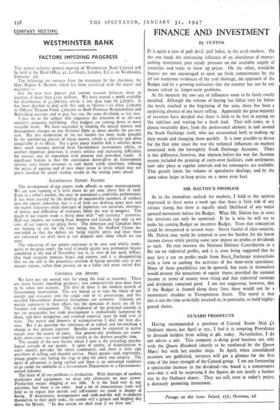FINANCE AND INVESTMENT
By CUSTOS
IT is again a case of pull devil, pull baker, in the stock markets. On the one hand, the continuing influence of an abundance of money- seeking investment puts steady pressure on the available supply of securities and tends to force up prices. On the other, would-be buyers are not encouraged to open up fresh commitments by the all 'too numerous evidences of the coal shortage, the approach of the Budget and by a growing realisation that the country has not by any means solved its longer-term problems.
At the moment the two sets of influences seem to be fairly evenly matched. Although the volume of buying has fallen very far below the levels reached at the beginning of the year, there has been a surprising absence of any heavy selling. Apparently the great majority of investors have decided that there is little to be lost in staying on 'the sidelines and waiting for a fresh lead. That will come, as it almost invariably does, from the professional element in and around the Stock Exchange itself, who are accustomed both to making up their minds and changing them quickly. It is now possible to detect for the first time since the war the technical influences on markets associated with the fortnightly Stock Exchange Accounts. There is this difference, however, that whereas before the war the Account system included the granting of carry-over facilities, cash settlements now take place at regular intervals and no contangoes are available. That greatly limits the volume of speculative dealings, and by the same token helps to keep prices on a more even keel.
MR. DALTON'S PROBLEM
As to the immediate outlook for markets, I hold to the opinion expressed in these notes a week ago that there is little risk of any serious slump, but there is equally small likelihood of any major upward movement before the Budget. What Mr. Dalton has in store for investors can only be surmised. If he is wise he will try to make his coming Budget an incentive Budget. Even that conception could be interpreted in several ways. Never fearful of class taxation, Mr. Dalton may easily be tempted to ease the burden for the lower income classes while putting some new impost on profits or dividends as such. He may increase the National Defence Contribution as a flat tax on industrial profits, and it is even being suggested that he may levy a tax on profits made from Stock Exchange transactions with a view to curbing the activities of the short-term speculator. None of these possibilities can be ignored, but none in themselves would destroy the attractions of equity shares provided the national income in terms of money were rising and that industrial earnings and dividends remained good. I am not suggesting, however, that if the Budget is framed along these lines there would not be a momentary shudder in Throgmorton Street. The moral is that this is not the time to be fully invested or, in particular, to hold highly- geared shares.
CUNARD PROSPECTS
Having recommended a purchase of Cunard Steam Ship Li Ordinary shares last April at 25s., I feel it is tempting Providence to dissuade holders from selling at 48s. today. Nevertheless, I do not advise a sale. This company is doing good business not only with the Queen Elizabeth (shortly to be reinforced by the Queen Mary) but with her smaller ships. In April, when consolidated accounts are published, investors will get a glimpse for the first time of the inner strength of the Cunard group. I am not forecasting a spectacular increase in the dividend—the board is a conservative one—but it will be surprising if the figures do not justify a further rise in the Ordinary shares. They are still, even at today's prices, a distinctly promising investment.


































 Previous page
Previous page